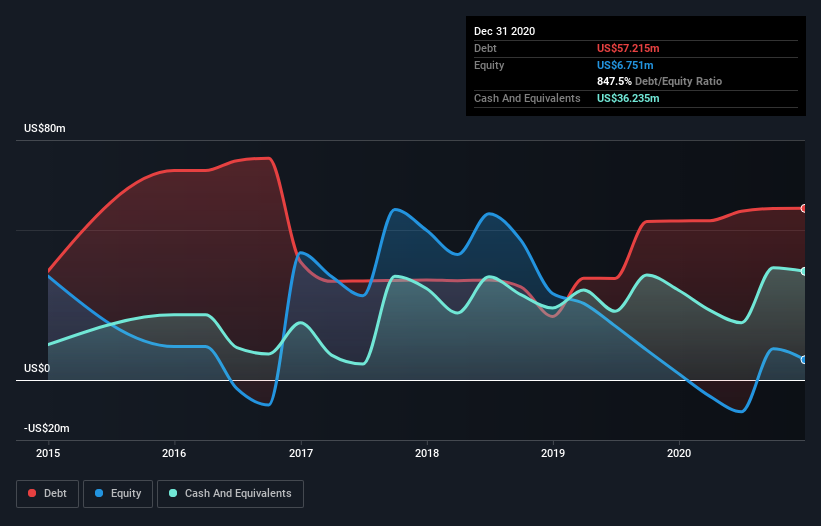- United States
- /
- Medical Equipment
- /
- NasdaqGM:APEN
Is Apollo Endosurgery (NASDAQ:APEN) A Risky Investment?

The external fund manager backed by Berkshire Hathaway's Charlie Munger, Li Lu, makes no bones about it when he says 'The biggest investment risk is not the volatility of prices, but whether you will suffer a permanent loss of capital.' When we think about how risky a company is, we always like to look at its use of debt, since debt overload can lead to ruin. As with many other companies Apollo Endosurgery, Inc. (NASDAQ:APEN) makes use of debt. But should shareholders be worried about its use of debt?
When Is Debt Dangerous?
Debt and other liabilities become risky for a business when it cannot easily fulfill those obligations, either with free cash flow or by raising capital at an attractive price. Ultimately, if the company can't fulfill its legal obligations to repay debt, shareholders could walk away with nothing. However, a more common (but still painful) scenario is that it has to raise new equity capital at a low price, thus permanently diluting shareholders. Of course, the upside of debt is that it often represents cheap capital, especially when it replaces dilution in a company with the ability to reinvest at high rates of return. The first thing to do when considering how much debt a business uses is to look at its cash and debt together.
Check out our latest analysis for Apollo Endosurgery
What Is Apollo Endosurgery's Net Debt?
As you can see below, at the end of December 2020, Apollo Endosurgery had US$57.2m of debt, up from US$53.0m a year ago. Click the image for more detail. However, because it has a cash reserve of US$36.2m, its net debt is less, at about US$21.0m.

How Strong Is Apollo Endosurgery's Balance Sheet?
Zooming in on the latest balance sheet data, we can see that Apollo Endosurgery had liabilities of US$11.7m due within 12 months and liabilities of US$59.0m due beyond that. Offsetting these obligations, it had cash of US$36.2m as well as receivables valued at US$10.7m due within 12 months. So its liabilities outweigh the sum of its cash and (near-term) receivables by US$23.7m.
Given Apollo Endosurgery has a market capitalization of US$157.1m, it's hard to believe these liabilities pose much threat. But there are sufficient liabilities that we would certainly recommend shareholders continue to monitor the balance sheet, going forward. When analysing debt levels, the balance sheet is the obvious place to start. But ultimately the future profitability of the business will decide if Apollo Endosurgery can strengthen its balance sheet over time. So if you're focused on the future you can check out this free report showing analyst profit forecasts.
Over 12 months, Apollo Endosurgery made a loss at the EBIT level, and saw its revenue drop to US$42m, which is a fall of 17%. That's not what we would hope to see.
Caveat Emptor
Not only did Apollo Endosurgery's revenue slip over the last twelve months, but it also produced negative earnings before interest and tax (EBIT). Its EBIT loss was a whopping US$16m. When we look at that and recall the liabilities on its balance sheet, relative to cash, it seems unwise to us for the company to have any debt. Quite frankly we think the balance sheet is far from match-fit, although it could be improved with time. However, it doesn't help that it burned through US$21m of cash over the last year. So in short it's a really risky stock. The balance sheet is clearly the area to focus on when you are analysing debt. However, not all investment risk resides within the balance sheet - far from it. These risks can be hard to spot. Every company has them, and we've spotted 3 warning signs for Apollo Endosurgery you should know about.
Of course, if you're the type of investor who prefers buying stocks without the burden of debt, then don't hesitate to discover our exclusive list of net cash growth stocks, today.
If you’re looking to trade Apollo Endosurgery, open an account with the lowest-cost* platform trusted by professionals, Interactive Brokers. Their clients from over 200 countries and territories trade stocks, options, futures, forex, bonds and funds worldwide from a single integrated account. Promoted
New: Manage All Your Stock Portfolios in One Place
We've created the ultimate portfolio companion for stock investors, and it's free.
• Connect an unlimited number of Portfolios and see your total in one currency
• Be alerted to new Warning Signs or Risks via email or mobile
• Track the Fair Value of your stocks
This article by Simply Wall St is general in nature. It does not constitute a recommendation to buy or sell any stock, and does not take account of your objectives, or your financial situation. We aim to bring you long-term focused analysis driven by fundamental data. Note that our analysis may not factor in the latest price-sensitive company announcements or qualitative material. Simply Wall St has no position in any stocks mentioned.
*Interactive Brokers Rated Lowest Cost Broker by StockBrokers.com Annual Online Review 2020
Have feedback on this article? Concerned about the content? Get in touch with us directly. Alternatively, email editorial-team (at) simplywallst.com.
About NasdaqGM:APEN
Apollo Endosurgery
Apollo Endosurgery, Inc., a medical technology company, focuses on the design, development, and commercialization of medical devices for gastrointestinal therapeutic endoscopy.
Excellent balance sheet with limited growth.
Similar Companies
Market Insights
Community Narratives



